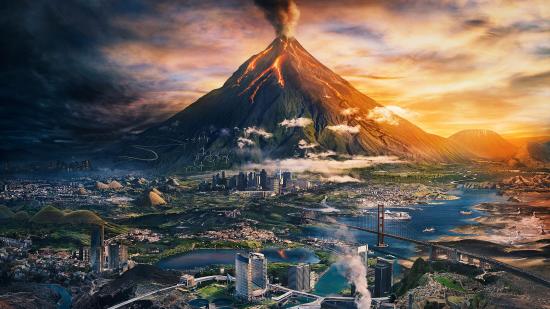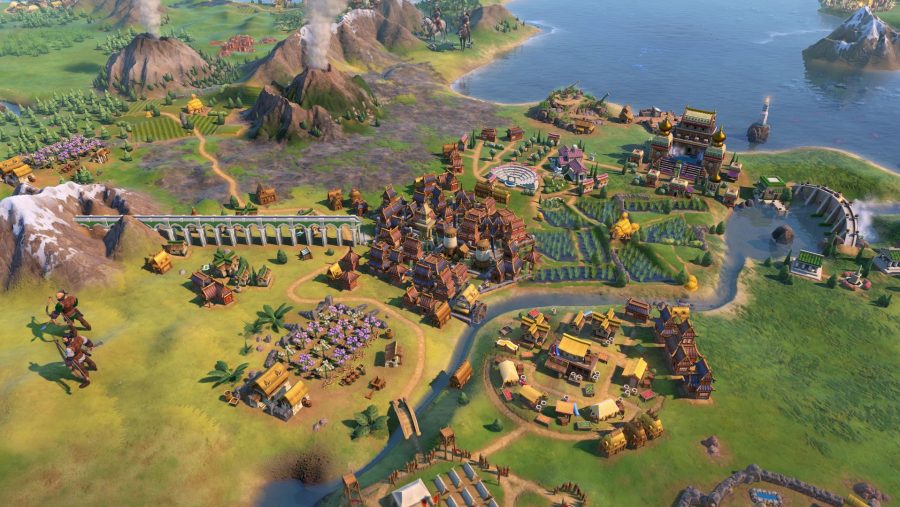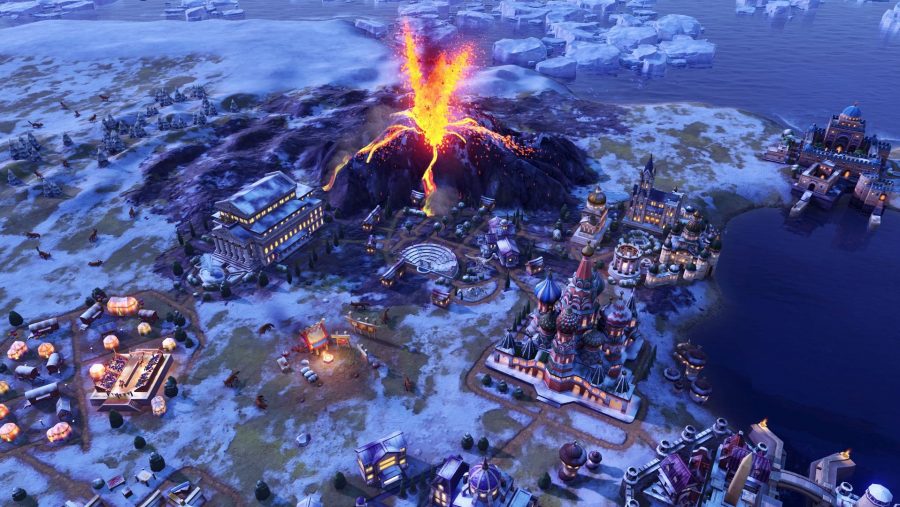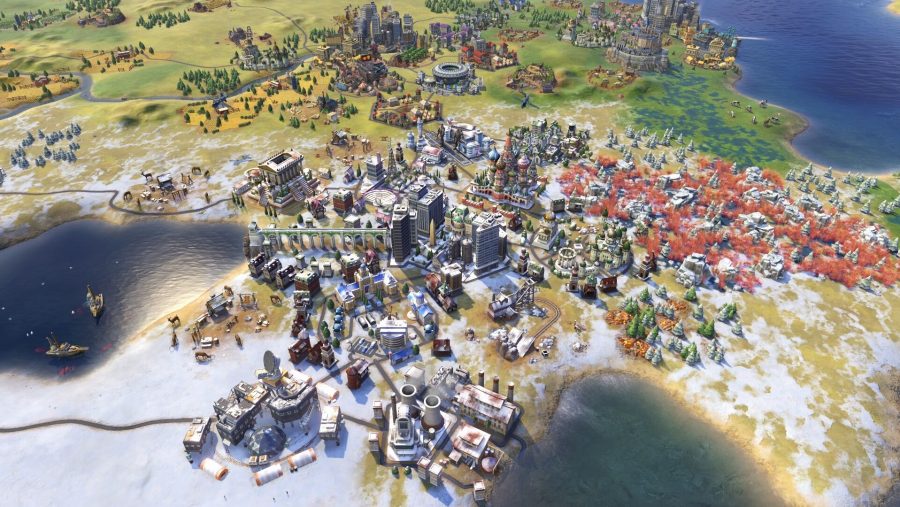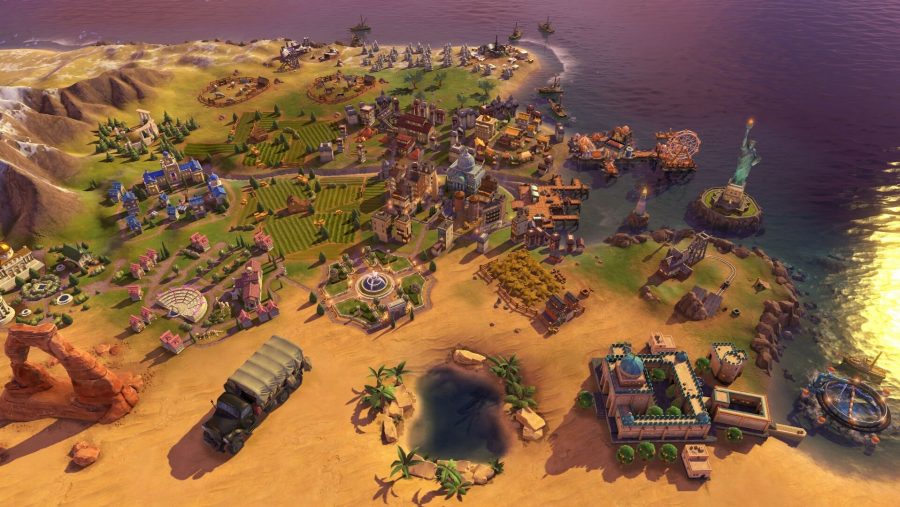Civilization VI’s next big expansion has been revealed. Gathering Storm is all about nature and humanity’s relationship with it: our attempts to shield ourselves from its wrath, and our relatively recent power to influence it on a global scale. Fittingly, Gathering Storm will also reintroduce the World Congress – the only traditional Civ feature to be missing from the base game – even as our own leaders wrestle with ecological questions.
Gathering Storm’s announcement and release map almost exactly onto the schedule for last year’s Rise and Fall. There are only 12 weeks to go until its release on February 14, so expect the new leaders to start trickling out via the official YouTube channel on a weekly basis at any time now.
We’ve got a rundown of all of Gathering Storm’s new systems here, but if you’re thirsty for yet more news in the meantime, we had a chat with lead designer Ed Beach and lead producer Dennis Shirk of developer Firaxis Games. Read on as we go into depth on how natural disasters will work, powering your cities, the new World Congress, diplomatic victory, and much more.
PCGamesN: Why did you settle on an ecological theme for Gathering Storm?
Ed Beach: We have always emphasised making the map and the planet one of the stars of the game in Civilization VI. We felt that, although it had been sort of touched on in passing in some of the early Civilization titles, it has never been given the full weight that we wanted it to. So we really wanted to dive into the interaction between mankind and the planet in both directions – the way the planet has throttled or shaped civilizations, and then how mankind has left its own imprint on the planet. We wanted to make that one of our key themes to build on for the expansion. When we got started that was the kernel of our idea of how to go about things and we just found more and more ways to integrate that into our game.
PCGN: It sounds like Gathering Storm models climate change, the existence of which is still disputed by some. Are you trying to send a message?
Beach: We’re not saying that there’s a right path or a wrong path. You’ll see as you play the game that there are actually some devious ecological things you can do. Maybe your neighbour has more coastal cities than you, so actually rising sea levels might not hurt you as much as your neighbour.

We also have a new diplomatic victory that we’re introducing in this expansion. There are things introduced through the World Congress, such as climate accords and treaties about deforestation. If you play protectively – in terms of what you’re doing to the planet – that’s definitely going to help you in the opinion of the other world leaders. That’s a choice that you have as a player, so if you’re going for the diplomatic victory, it’s probably easier if you’re making those kinds of choices that other world leaders will respect.
PCGN: I remember disasters in games like SimCity and always felt a little annoyed by the fact that the destruction felt arbitrary and outside of my control. Is this something you’re concerned about?
Beach: Yes, that was something we knew was a risk right away. We had big discussions internally about how to handle that, to make the player feel they can be smart and plan for these things. A good example of that is how river flooding works.
Now twice as many tiles are marked as floodplains than in previous Civilization games, and that can extend – it’s not just in the desert, but can be in other terrain. When you’re making a settlement decision with your [first] settler, the settler lens is getting a lot of information about where hazardous environmental areas might be. There’s a warning saying, ‘You can settle on that river, but beware these tiles are all susceptible to flooding’. You might want to be wary about how much you build in terms of structures there.
Then pretty early in the game – in the Classical era – the dam district, one of the first new engineering projects, unlocks. That can be placed along a river valley on one of those floodplain tiles. The river may still flood, but with your dam in place the flooding is going to be controlled, so it will increase the fertility of some of those floodplain tiles. You won’t be suffering the same kind of damage you would if you didn’t have the dam there.
Dennis Shirk: You obviously can’t stop a hurricane or a volcano erupting, but you can mitigate that risk along with the rewards that come with it. You know you have a volcano nearby, you’re obviously going to be careful about what you build there, but when a volcano erupts you know that fertility is going to be gained, so you want to build farms there. Just know that you might not want to put your most expensive asset beside a volcano, like a full district, because there’s a chance that it could be damaged.
With Civilization VI gameplay, a lot that has been put in around your decisions in where you’re going to place districts and other improvements around the city. So this is just another layer of consideration that the player has to take in mind.
PCGN: In what ways will we suffer the damage from natural disasters?
Beach: First thing to keep in mind is players will have a lot of control over how much of this kind of stuff they want when they start their game. Some people in our test group are like, “I love chaos, I just want to play in the most chaotic world possible.” So we have this slider, with five different settings. You can turn it all the way up to have the most destructive forces of nature possible. Most of the disasters have three different severity levels, and they won’t ever be so destructive as to be a total block on making progress, but based on where you put that slider, they will tend towards their most severe versions.
If you turn it all the way down, you’re only going to have very light impacts from the natural disaster systems. You’ll get still get the rewards, in terms of improved tile yields and so forth, along with the damage. So we feel that’s a good setting for the multiplayer community, where if you settle next to a volcano some stuff will happen, but you won’t have to worry about it being crazy and out of control.

PCGN: What causes these natural disasters? Are they random, or can they be aggravated by certain factors?
Beach: We have a random system behind it, but I want to think of it as controlled randomisation. There’s a lot that goes towards steering it towards certain random results. For instance, all rivers are set for a certain number of times that we want them to flood in a game based on what that natural disaster setting is. If they’re below that number, we tend to make it more likely that a particular river will flood, and less likely that one that’s already flooded a bunch of times will flood again. So we try to sort of steer it towards a expected result that way.
Another important factor in our randomisation is whether or not you’ve let the planet warm up too much later in the game. Once the power systems come online you can pump a lot of CO2 into the atmosphere. As global temperature rises, the chance of a lot of these effects, like flooding and hurricanes, does increase. We have a new climate screen built into the game, like a weather report on how your planet is doing at that moment. You’ll see as the temperature rises, you can check that screen and kind of see ‘oh, wow, I’ve got 30% more chance of flooding that I normally would have right now’.
PCGN: Gathering Storm will add two new scenarios – one based on the buildup to World War I, and one based on the Black Death. Is disease one of the disasters in the main game?
Shirk: No, no. We didn’t want to have disease yet, but that scenario definitely has disease in it. That was a really fun exercise. Something Ed’s touched on in the past is that scenarios give us a really great development field for trying out ideas. This is definitely one of those places, and it was actually pretty successful. Black Death is a really great race against one of the more unfortunate parts of our planet.
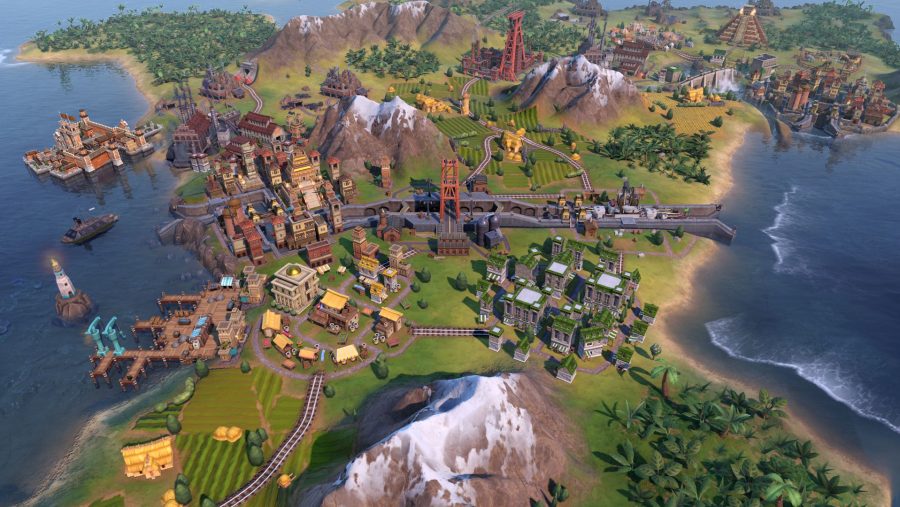
PCGN: You mentioned power management – how exactly does that work?
Beach: There’s a couple of key changes here. The first is to the way strategic resources work. We’ve gone back to a system where we itemise strategic resource to a more granular level than before. You have a stockpile of each strategic resource now. Early in Civ VI it was just access to a strategic resource that would unlock certain units. Now you’re actually going to be counting numbers in terms of iron, horses, coal, oil, and so forth.
PCGN: Sounds similar to Civ V.
Beach: It is, but, because [power plants] burn coal on a turn by turn basis, it’s actually even more granular than in Civ V. When you start unlocking factories, the first power plant, which is the coal power plant, comes online at the same time. You can put that in place in your industrial zone. That, unfortunately, is the one that pumps the most carbon into the atmosphere. So you’ll probably want to improve that as you go through the game – even an oil plant is a bit better in terms of your CO2 footprint, but we offer a raft of sort of renewable energy alternatives. If you have a dam in your city, you can put in place a hydroelectric plant. And later in the tech tree, we get to wind farms, solar farms, etc.
The other point that I haven’t explained is what’s the good of power? Why do you want it? From the point where you get the first power plant online, all the buildings that you can put in place in your city from that point forward – things like research labs, broadcast centres – [they still function without power] but what you really want to do is put in place power for them because then they become significantly stronger.
PCGN: So there’s no downside having insufficient power. Is it all upside?
Beach: It’s true that there’s no major growth penalty or production penalty on the city, but you’re losing a lot. [Without power] those buildings are, I think, weaker at the endgame now than they used to be. So if your city’s not powered you’re not performing as well as in Rise and Fall or the base game.
PCGN: What’s the new era called?
Shirk: We just call it the Future Era. The interesting hook with that is we’ve looked ahead at things like ‘what could the future of governments look like? What could the future of military forces look like?’. We’re not going to give out all the information about that right now. But one of the interesting things about that era is, because it’s about technologies and civics that mankind hasn’t got to yet, the rigid structure of a tech tree didn’t make much sense. What happens now in that era is there’s a randomisation that goes into it each time you start a game, so its technologies and civics don’t always hook up the same way.
Beach: This adds a little bit of uncertainty: you may think you’ve got the science victory locked down, but you need to get up there and actually research these things before you can be too confident about that.
PCGN: How will this longer timeline change things like the science victory?
Beach: In order to really engage with climate change we felt like our game had to run until at least 2050. So that was a lot of our impetus between needing to add the extra era. We thought ‘Well, if that’s the case, we’re going to have to to push back the science and culture victories and rework those so that they have that extended play’. We’re not going to go into too many details about what exactly we’ve done on changing those victories. But in general we’ve tried to push them back and then work in things that you’re going to unlock during that last era that are going to be key components to getting those victories.
PCGN: But they still function the same way – you’re still building spaceship parts in the science victory and competing for tourists for the cultural victory?
Beach: Yes.
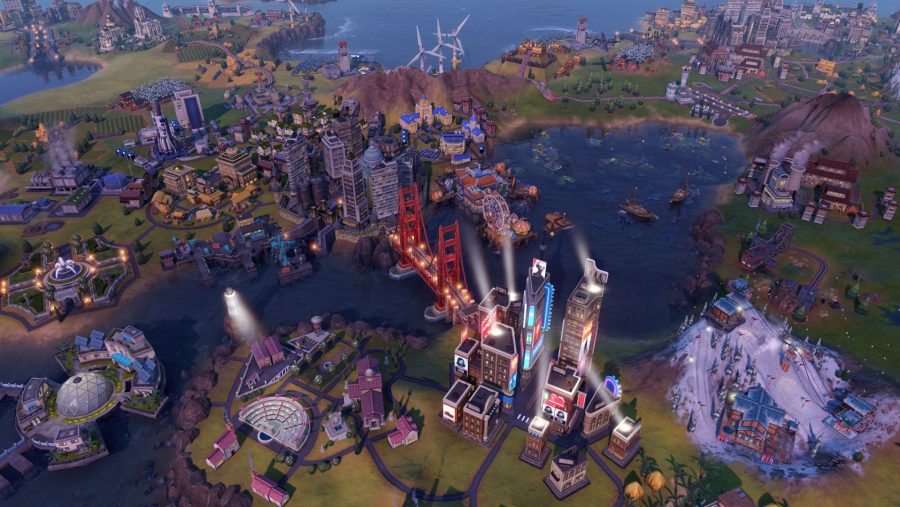
PCGN: The World Congress is back, which is exciting. Can you outline what’s different about its latest incarnation?
Beach: First of all, probably one important difference is there are now two different types of World Congress sessions. So if you think about the emergencies that were introduced in Rise and Fall, that was a case of the world community saying ‘hey, something traumatic has happened in the world, and we need to band together and all address this together’. So that mechanic is now folded into our World Congress. That’s called a special session of the World Congress, and the opportunity to call for a special session comes up if one of those emergency situations happens. And now you can also call for a special session to request humanitarian aid if you get hit by enough damage from a natural disaster.
Along with the special sessions we have periodic meetings of the World Congress. That’s where, just like in Civ V, you can play with the rules of the game by passing resolutions. [In Civ V] we had maybe 15 different resolutions, but they were all very strict in terms of exactly what the rules were, like plus 20% science, minus 20% culture.
We wanted to add more flexibility this time, so we have about the same number of resolutions, but each has a positive and a negative. For instance, you can pass, say, a deforestation treaty, and one of the things you can do is say ‘ok, the planet is suffering, everyone’s prohibited from cutting down rainforest until the World Congress meets again’. On the flip side of that is the ability to say, ‘we don’t care about the planet, we’ve decided we’re just going to exploit it for everything that that we can right now’. Then between now and the next Congress it’s going to be even better than usual to cut down rainforest tiles.
The new system’s extra flexibility also allows you to choose a target for a lot of these resolutions. In the deforestation treaty that’s what type of natural feature we are talking about cutting down. There are a lot of other examples, where it might be which luxury good is banned from trade, which type of city state we want people to work with, which type of Great People we’re going to emphasise, those kinds of things. We allow a lot of flexibility for you to craft your own resolution.
Shirk: There’s a new yield called favour, which you can earn by having allies, and which allows you to pump up the weight of your vote. I don’t know if you remember the World Congress system in Civ V, but one of the flaws that our fans would always point out was that ultimately, if you had enough gold, you could just buy off city states. This is something we really wanted to avoid. Now you earn your favour by doing things in the international community as you play through the game, and that’s how you then to actually influence votes instead of just paying people.
Beach: Things like promising not to settle near somebody, promising not to dig up artefacts in someone else’s land, liberating a city state, liberating another player – all those things earn you favour. Favour can also be traded on the deal table, so there are a lot of ways to get it. City states do still play a bit of a role, like in Civ V, in that each city state you’re Suzerain of is going to give you one favour per turn.
Once you’ve got that favour, the key thing people are going to use it for is to try and win votes that you need in order to get to the diplomatic victory. But, even if you’re not playing for the diplomatic victory, favour can still be a very important part of your strategy.
Shirk: You can shield yourself from an emergency if you play your game right. If you know that you’re going to be going on the offence and want to avoid an emergency, then when that special session is called you can take that favour that you’ve been banking and pump up your vote enough so that you can shield yourself from having an emergency declared against you and have the vote fail.
Beach: It may be that you need somebody to not declare an emergency on you if you’re going for a domination victory, or you might need people to not condemn your religion if you’re going for the religion victory.
PCGN: You mentioned the new diplomatic victory – how has that changed?
Beach: Through the modern era and beyond, in most sessions of the World Congress there will be a resolution to see whether someone gets points towards a diplomatic victory. That’s something we’re balancing right now: how many times you need to win that vote. We’re trying to make sure that all the different victories are roughly equal in difficulty. But you won’t be able to just win that vote once and claim the diplomatic victory – you’ll have to show diplomatic leadership over several eras of the game, and win that vote multiple times, in order to achieve the diplomatic victory.
Shirk: Others can also take your diplomatic victory votes away from you [via the negative side of the diplomatic victory resolution], which is why it’s really important to play the favour game if you want to focus on the diplomatic victory.
PCGN: Will there be any major changes to other vanilla or Rise and Fall systems?
Beach: We look at all our systems every time we do an expansion, and we focus on which things we feel need to be refurbished. The one that got the most attention this time was the Governor system, just because we needed new governor effects – some of the ones that had to do with strategic resources before had to be replaced. The structure of the mechanics there are all the same, but in terms of all the different gameplay bonuses that are assigned to all the governors, we’ve rebalanced that completely so they take into account new Gathering Storm features.
We wanted to make all the governors very strong and appealing, depending on your strategy. We’ve touched a lot of systems beyond that – there are base game civs that have had their bonuses reworked, there are new espionage missions and new espionage promotions, and we’ve rebalanced the military side of the game, so the strength of air units has been buffed. We’re definitely looking at things and fine tuning as we go.
